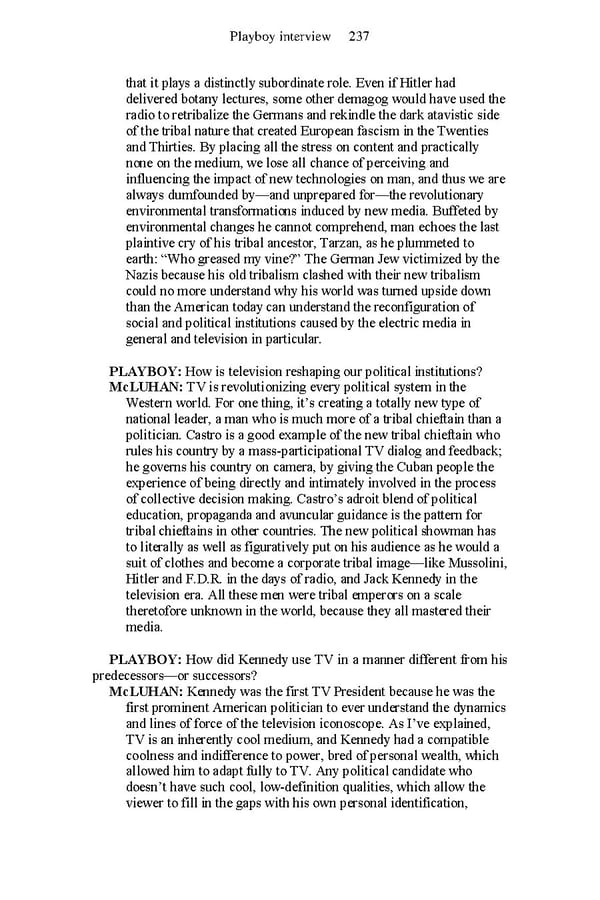Playboy interview 237 that it plays a distinctly subordinate role. Even if Hitler had delivered botany lectures, some other demagog would have used the radio to retribalize the Germans and rekindle the dark atavistic side of the tribal nature that created European fascism in the Twenties and Thirties. By placing all the stress on content and practically none on the medium, we lose all chance of perceiving and influencing the impact of new technologies on man, and thus we are always dumfounded by—and unprepared for—the revolutionary environmental transformations induced by new media. Buffeted by environmental changes he cannot comprehend, man echoes the last plaintive cry of his tribal ancestor, Tarzan, as he plummeted to earth: “Who greased my vine?” The German Jew victimized by the Nazis because his old tribalism clashed with their new tribalism could no more understand why his world was turned upside down than the American today can understand the reconfiguration of social and political institutions caused by the electric media in general and television in particular. PLAYBOY: How is television reshaping our political institutions? McLUHAN: TV is revolutionizing every political system in the Western world. For one thing, it’s creating a totally new type of national leader, a man who is much more of a tribal chieftain than a politician. Castro is a good example of the new tribal chieftain who rules his country by a mass-participational TV dialog and feedback; he governs his country on camera, by giving the Cuban people the experience of being directly and intimately involved in the process of collective decision making. Castro’s adroit blend of political education, propaganda and avuncular guidance is the pattern for tribal chieftains in other countries. The new political showman has to literally as well as figuratively put on his audience as he would a suit of clothes and become a corporate tribal image—like Mussolini, Hitler and F.D.R. in the days of radio, and Jack Kennedy in the television era. All these men were tribal emperors on a scale theretofore unknown in the world, because they all mastered their media. PLAYBOY: How did Kennedy use TV in a manner different from his predecessors—or successors? McLUHAN: Kennedy was the first TV President because he was the first prominent American politician to ever understand the dynamics and lines of force of the television iconoscope. As I’ve explained, TV is an inherently cool medium, and Kennedy had a compatible coolness and indifference to power, bred of personal wealth, which allowed him to adapt fully to TV. Any political candidate who doesn’t have such cool, low-definition qualities, which allow the viewer to fill in the gaps with his own personal identification,
 Essential McLuhan Page 243 Page 245
Essential McLuhan Page 243 Page 245